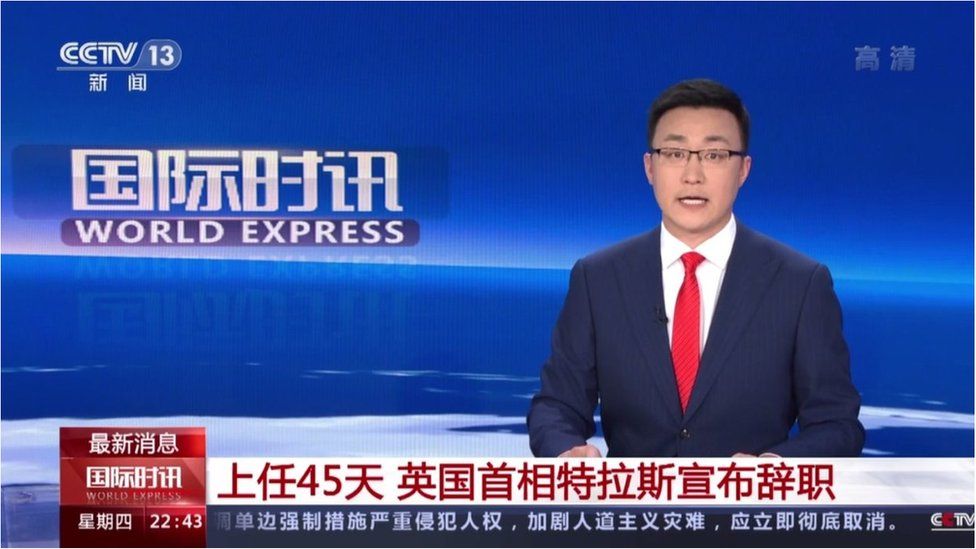ARTICLE AD BOX
 Image source, CCTV
Image source, CCTV
Liz Truss's resignation has made headlines around the world, including in China
News of Liz Truss's resignation has prompted quick reaction from political leaders and media commentators around the world, with many editorials focused on the brevity of Truss's time in office and the ongoing political chaos in Britain.
Among foreign politicians, France's President Emmanuel Macron said that on a personal level, he was always "sad to see a colleague go", but that the most important thing was for Britain to find stability as soon as possible.
At the White House, reporters asked US President Joe Biden whether Ms Truss had made the right decision. He replied that it was her decision to make, adding that he wouldn't "weigh in on her judgment".
In an earlier statement, Mr Biden said close relations with the UK would continue, and thanked Ms Truss for her partnership "on a range of issues including holding Russia accountable for its war against Ukraine".
One of Ukraine's MPs - Oleksiy Goncharenko - also thanked Ms Truss for her support, saying that "Ukraine will never forget you!"
However, there was little sympathy for Liz Truss from Russia. Its foreign ministry spokeswoman welcomed her departure, saying Britain had "never known such a disgrace of a prime minister."
Meanwhile, many commentators from around the world were equally unreserved in their appraisals.
'A stark repudiation of her leadership'
The Daily Stars' longevity competition between Ms Truss and a lettuce appears to have cut through to international audiences. "Her agenda had floundered, her own party had turned on her and commentators widely speculated on whether she could outlast a head of lettuce. She couldn't," wrote the New York Times.
Even the Russian politician Dmitry Medvedev - a close ally of President Vladimir Putin - referenced the feature, bidding a sarcastic farewell to Ms Truss on Twitter, saying: "Bye, bye @trussliz, congrats to lettuce.
The Washington Post summed up the prime minister's end: "A disastrous series of self-inflicted wounds — which turned into a political death spiral — began with a misfired attempt by the Conservative leader to radically reorient the government's economic agenda by slashing taxes without saying how the move would be paid for. The markets responded badly, and Truss never recovered."
Canada's Globe and Mail wrote: "On Wednesday she lost the second of the government's four most senior ministers, faced laughter as she tried to defend her record to parliament and saw her lawmakers openly quarrel over policy, deepening the sense of chaos at Westminster."
The Sydney Morning Herald said Ms Truss' tenure had been "engulfed in financial chaos".
The London correspondent of Brazil's GloboNews described the situation in the UK as "utter turbulence, chaos on all fronts, a government in intensive care", while in Argentina, La Nación told of a "crisis in Great Britain".
In China, state broadcaster CCTV said that Truss's administration delivered "the largest tax cut measures in 50 years" which later "caused massive volatility in the financial market and strong public opposition".
And Saudi Arabia-based Al Arabiya noted "turmoil" in the UK Government and in the "Conservative Party in particular".
Descent into hell
In Europe, The Irish Times pulled no punches in describing "a low moment in the history of British politics".
"Whatever emerges in the next week, the mother of parliaments has been reduced to a bad joke, its constitution a laughing stock," it said, later adding: "A prime minister is normally supposed to stand for something. Truss in Downing Street today stood for nothing."
France's Le Figaro described Liz Truss's "descent into hell". It wrote: "She will go down as the most short-lived prime minister in contemporary history, with just 44 days in office during which she deepened the economic hardship of millions of Britons, weakened her country's image internationally and depleted what was left of unity in a conservative party weakened after 12 years in power."
Spanish newspaper El Pais was particularly blunt. "She had become a prime minister devoid of content, without a program to defend, incapable of effectively communicating the work of the government and completely at odds with her parliamentary group."
"The fiasco of Wednesday's vote on a booby-trapped motion by the Labour opposition made matters worse. Shaking, shoving and shouting among Tory MPs , forced to vote against their will on an issue as controversial as fracking to show their loyalty to a government that was falling apart minute by minute."
In Germany, tabloid Bild describes the situation as a "Brit-quake", adding that the "head of lettuce is having a big party now", in another reference to the Daily Star's lettuce.
Broadsheet Suddeutsche Zeitung said Ms Truss had a tough time from the start, and that she could "no longer withstand the massive criticism from within her own ranks".
Watch: Watch Liz Truss step down as PM

 2 years ago
54
2 years ago
54








 English (US)
English (US)